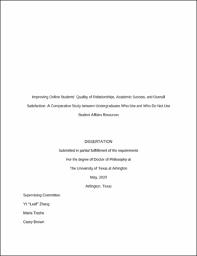
ATTENTION: The works hosted here are being migrated to a new repository that will consolidate resources, improve discoverability, and better show UTA's research impact on the global community. We will update authors as the migration progresses. Please see MavMatrix for more information.
Show simple item record
| dc.contributor.advisor | Zhang, Yi Leaf | |
| dc.creator | Duvall, David | |
| dc.date.accessioned | 2020-06-12T22:20:22Z | |
| dc.date.available | 2020-06-12T22:20:22Z | |
| dc.date.created | 2020-05 | |
| dc.date.issued | 2020-05-20 | |
| dc.date.submitted | May 2020 | |
| dc.identifier.uri | http://hdl.handle.net/10106/29101 | |
| dc.description.abstract | Online education is the fastest-growing option for student seeking completion of a degree from an institution of higher education. Students enjoy the increase pace of the coursework and the autonomy to complete it on their own time, while universities identify online education as a key factor in increasing their enrollment. However, the attrition rates of students seeking a degree through online coursework is much higher than that their on-campus counterparts. With factors such as funding, institutional rankings, and accreditation linked to the retention and graduation of its students, colleges and universities have much to gain by increasing the persistence of their online students.
The existing research on online student persistence is almost exclusively focused on factors that affect their satisfaction and performance in their coursework. These factors include engagement with their peers and faculty and identifying how the coursework aligns with their academic and professional goals. For campus-based students, research identifies that social integration in extracurricular activities traditionally offered by student affairs departments is a key factor in their persistence. However, very little research exists to identify whether online students benefit in similar ways when they utilize student affairs resources. Therefore, this study addressed a gap in research to examine whether utilization of student affairs resources can be a factor in supporting online student persistence and satisfaction.
This study surveyed online undergraduate students at a large, public institution that offers a variety of degree programs in online formats. The data collected from the survey identified students’ utilization of student affairs resources, the quality of their interactions with various university constituents, and their satisfaction with their university experience. Combined with demographic data and grade point averages (GPAs), the quantitative analysis identified the relationships between each of these factors and developed models for predicting online student satisfaction.
The results of this study reveal that utilization of certain student affairs departments can support online students’ quality of interactions with their peers, faculty, and university staff, as well as their overall satisfaction with their university experience. However, utilization of student affairs resources also is linked to slightly lower GPAs for online students. The model identified that quality of relationships and utilization of student affairs resources can help predict online student satisfaction. | |
| dc.format.mimetype | application/pdf | |
| dc.language.iso | en_US | |
| dc.subject | Online students | |
| dc.subject | Student affairs | |
| dc.title | Improving Online Students’ Quality of Relationships, Academic Success, and Overall Satisfaction: A Comparative Study between Undergraduates Who Use and Who Do Not Use Student Affairs Resources | |
| dc.type | Thesis | |
| dc.degree.department | Educational Leadership and Policy Studies | |
| dc.degree.name | Doctor of Philosophy in Educational Leadership and Policy Studies | |
| dc.date.updated | 2020-06-12T22:20:23Z | |
| thesis.degree.department | Educational Leadership and Policy Studies | |
| thesis.degree.grantor | The University of Texas at Arlington | |
| thesis.degree.level | Doctoral | |
| thesis.degree.name | Doctor of Philosophy in Educational Leadership and Policy Studies | |
| dc.type.material | text | |
Files in this item
- Name:
- DUVALL-DISSERTATION-2020.pdf
- Size:
- 910.8Kb
- Format:
- PDF
This item appears in the following Collection(s)
Show simple item record


